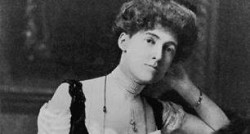One of my all-time favorite books is The House of Mirth, by Edith Wharton, and one of my all-time favorite quotes is also by her: “Life is always a tightrope or a featherbed. Give me the tightrope.” So it follows that one of my all-time greatest honors was writing the introduction for the newly reissued edition of her classic travelogue, A Motor-Flight Through France.
Here’s a quick description, from publisher Restless Books:
A trailblazer among American women at the turn of the century, Edith Wharton set out in the newly invented “motor-car” to explore the cities and countryside of France. As the Whartons embark on three separate journeys through the country in 1906 and 1907, accompanied first by Edith’s brother, Harry Jones, and then by Henry James, Edith is enamored by the freedom that this new form of transport has given her. With a keen eye for architecture and art, and the engrossing style that would later earn her a Pulitzer Prize in fiction, Wharton writes about places that she previously “yearned for from the windows of the train.”
Now published for the first time as an illustrated eBook with photographs reproduced directly from the 1908 first edition, and newly introduced by acclaimed travel writer Lavinia Spalding, the Restless Books edition of A Motor-Flight Through France will inspire current and future generations of readers and adventurers.
And here’s a short excerpt from my intro:“Although we know Wharton best for her novels and novellas—she penned twenty-one, including such classics as The House of Mirth, The Age of Innocence, The Custom of the Country, and Ethan Frome—she also wrote luminously about travel, publishing three travel memoirs and many articles. Her close friend Henry James (who accompanied her on one of her motor-flights through France) nicknamed her “pendulum-woman” because she crossed the Atlantic so often—as many as seventy times in her life. Wharton wrote that she had “an incurable passion for the road” and once told a friend that she planned to “eat the world leaf by leaf.”
Unlike many other wealthy wanderers of her time, Wharton was not content with ordinary tourism; it was the unbeaten path that called her. Her friend Percy Lubbock wrote that she “rustled unhesitatingly” into locked churches, closed galleries, and palaces where visitors were not normally allowed, in search of “hidden rarities, lost treasures and forgotten shrines.” Long before the invention of the automobile, she traveled by almost any means available—bicycle, train, mule, donkey cart, funicular, or on foot—in pursuit of obscure sites. Everything changed in 1903, when Wharton took her first ride in a motorcar in Italy and discovered her ideal mode of transportation. “I swore then and there,” she wrote, “that as soon as I could make money enough I would buy a motor.”
A Motor-Flight Through France is the first release in the Restless Women Travelers series, from new digital publisher Restless Books. The series celebrates and (re)introduces some of the most important travelogues written by women, with introductions by some modern women travel writers. And I’m thrilled to announce that A Motor-Flight Through France is now available to download from Amazon, Apple, Barnes and Noble, and Kobo, for only $3.99!
When I began doing research about Wharton for the introduction, filling my head every day with her words and stories, reading her autobiography, two biographies, articles, and as many letters as I could get ahold of, I became completely intimidated by her. She was the first woman to win a Pulitzer Prize, the first woman to be given an honorary Doctor of Letters degree from Yale, the first woman awarded the gold medal for literature from the American National Institute of Arts and Letters. She was nominated for the Nobel Prize for lifetime achievement in literature. She wrote forty-eight books, many of them bestsellers. The list goes on and on. The woman was, to put it mildly, formidable. She was also known for her razor-sharp wit, and the fact that she did not suffer fools.
Countless fascinating stories exist about Wharton, but one of my favorites is this: She hated the illustrations that Scribner included in The House of Mirth, so she razored them out of her own personal copy, and crossed out the name of the illustrator on the title page. Hearing this story, I found myself wondering, if we’d met, would she have liked me or hated me or tolerated me or ignored me? Would she have crossed out my name on the title page, too? But the more I got to know her, the more I fell in love. She’s immensely inspiring, as a writer, a traveler, and a woman. Edith Wharton was rebellious, courageous, brilliant, intrepid, and just basically hell-bent on doing whatever she damn well pleased, during an era in which women of her societal position were really just supposed to behave. In the end I decided that if she’d had the chance to know me, she would have liked me, because I would not have stopped until I’d made her like me.
There’s so much more to tell about her. I hope you’ll download a copy of the new edition of A Motor-Flight Through France, and—I’m really excited about this—join me in the Berkshires on Sunday, June 22 for a very special book launch party! Restless Books is hosting the launch for A Motor-Flight Through France and the Restless Women Travelers series. The event will take place at The Mount—Edith Wharton’s gorgeous mansion (see photo below, and insert yourself into the picture). Beginning at 5:30, there will be a short reading, conversation, and cocktails on the patio overlooking Wharton’s gardens, with fellow readers, writers, and travelers. I’ll be there, and I hope you will, too!












